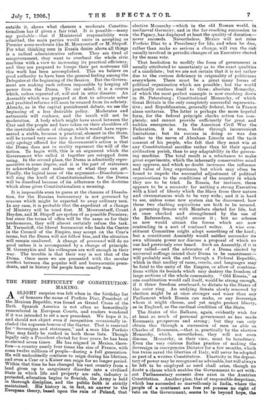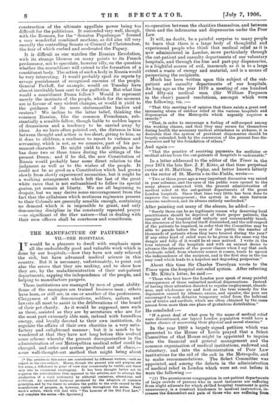THE FIRST DIFFICULTY OF CONSTITUTION- A SLIGHT surprise was felt when
in the birthday list of honours the name of Porfirio Diaz, President of the Mexican Republic, was found as Grand Cross of the Bath. Spanish America is not often so honorifically remembered in European Courts, and readers wondered if it was intended to set a new precedent. We hope it is, and should not object even if recognition occasionally in- cluded the supreme honour of the Garter. That is reserved for "Sovereigns and statesmen," and a man like Porfirio Diaz may fairly be ranked in both those lists. Though legally only a President elected for four years, he has been re-elected seven times. He has reigned in Mexico, there- fore—a country nearly four times the size of France, with some twelve millions of people—during a full generation. He will undoubtedly continue to reign during his lifetime, and even a Czar or a Kaiser can reign for no longer period. Within that time he has changed his vast country from a land given up to sanguinary disorder into a civilised State in which life and property are safe, industry is protected, education begins to flourish, the Army is held in thorough discipline, and the public faith is strictly maintained. His history is, in fact, an answer to the European theory, based upon the ruin of Poland, that elective Monarchy—which in the old Roman world, in mediaeval Germany, and in the far-reaching succession to the Papacy, has displayed at least the quality of duration— never succeeds. Nevertheless, Mexico will not raise Porfirio Diaz to a Presidency for life, and when he dies, rather than make so serious a change, will run the risk usually involved in periodic changes of an Executive elected by the mass vote.
That hesitation to modify the form of government is usually attributed to uncertainty as to the exact qualities of a candidate ; but we are not certain that it is not rather due to the curious deficiency in originality of politicians everywhere. There must be a great many forms of political organisation which are possible ; but the world practically confines itself to three : absolute Monarchy, of which the most perfect example is now crashing down in St. Petersburg ; Constitutional Monarchy, of which Great Britain is the only completely successful representa- tive; and Republicanism, generally federal, but in France alone unitarian. The latter is perhaps the more hopeful form, for the federal principle checks action too com- pletely, and cannot provide sufficiently for great and sudden emergencies. In the American Civil War the Federation, it is true, broke through inconvenient limitations ; but its success in doing so was due rather to the nerve of Abraham Lincoln and the tacit consent of his people, who felt that they must win at any Constitutional sacrifice rather than let their special civilisation perish, than to any adaptability in the govern- ing machine. The total result is a reluctance to make great experiments, which the inherently conservative mind may approve, and which no doubt increases the influence and value of long experience, but which may often be found to impede the successful adjustment of political organisations to the conditions of the country in which they are to be tried. In Russia, for instance, there appears to be a necessity for uniting a strong Executive with a kind of liberty which the Slays from their nature and circumstances wish to be very wide ; and it is hard to see, unless some new system can be discovered, how these two clashing aspirations are both to be secured. A governing Senate with Members elected for life, but at once checked and strengthened by the use of the Referendum, might secure it ; but no scheme so new would attract the forces which are now contending in a sort of confused welter. A wise con- stituent Committee might adopt something of the kind ; but a constituent Assembly would neither surrender its own ultimate power nor discuss a proposal of which no one had previously ever heard. Such an Assembly, if it is ever called—and the advocates of a Duma elected by universal suffrage intend their Duma to be constituent— will probably seek the end through a Federal Republic, which in that medley of races, creeds, and languages may be fatal to the unity of the Empire, or allow of combina- tions within its bounds which may destroy the freedom of large sections of the whole community. "Old Russia," as one combination would call itself, would be strong enough, if it threw freedom overboard, to dictate to the States of the outer ring. An undying Senate slowly renewed by election might be at once stronger and wiser than any Parliament which Russia can make, or any Sovereign whom it might choose, and yet might protect liberty, as in England, as the cardinal condition of the State.
The States of the Balkans, again, evidently wish for at least as much of personal government as has made Roumania prosperous and strong ; but they can only obtain this through a succession of men as able as Charles of Roumania,—that is, practically by the elective Monarchy, which, nevertheless, they will not even discuss. Monarchy, in their view, must be hereditary. Even the very curious Italian practice of making the Sovereign in emergencies Dictator for a few months, which has twice saved the liberties of Italy, will never be adopted as part of a written Constitution. Elasticity in the deposi- tary of power may be recognised as advisable, but will always be left to be employed as need shall arise, though no doubt a clause which enables the Government to act with- out Parliamentary consent does exist in the Austrian Constitution. Another plan, that of responsible despotism, which has succeeded so marvellously in India, where the people of s continent are free yet possess no right of veto on the Government, seems to be beyond hope, the construction of the ultimate appellate power being too difficult for the politicians. It succeeded very well, though, with the Romans, for the " Senatus Populusque " formed a very wonderful combined machine, as did also till very recently the controlling Senate or Council of Christendom, the fear of which curbed and moderated the Papacy.
It is difficult as one watches the Russian Revolution, with its strange likeness on many points to its French predecessor, not to speculate, however idly, on the question whether the resemblance will extend to the formation of a constituent body. The action of such a body in Russia would be very interesting. It would probably spoil its repute by savage punishment of recognised enemies of the people. General Pavloff, for example, would on Tuesday have almost inevitably been sent to the guillotine. But what line would a constituent Duma follow ? Would it represent merely the instincts of the people, which for the moment are in favour of very violent changes, or would it yield to the guidance of its more statesmanlike leaders and orators ? We incline, to the latter belief, thinking the common Russian, like the common Frenchman, sub- stantially a sensible fellow, though liable to sudden lapses of dreaminess and a tendency to be carried away by ideas. As we have often pointed out, the distance in him between thought and action is too short, giving to him, as it does to children, a readiness to resort to violence and screaming, which is not, as we conceive, part of his per- manent character. He might yield to able guides, as he has done two or three times during the sittings of the present Duma ; and if he did, the new Constitution of Russia would probably bear some direct relation to the judgment as well as to the wishes of the people. It could not be so good as a Constitution which had grown slowly from slowly experienced necessities, but it might be a working arrangement which left the last of the great white races that is not enfranchised to follow its special genius, yet remain at liberty. We are all beginning to despair, but we may derive some encouragement from the fact that the syllabuses which mutinous regiments present to their Colonels are generally sensible enough, containing no demand which it is impossible to grant, and only denouncing discipline in the constantly repeated prayer —so significant of the Slav nature—that in dealing with their men officers shall be courteous and considerate.



















































 Previous page
Previous page